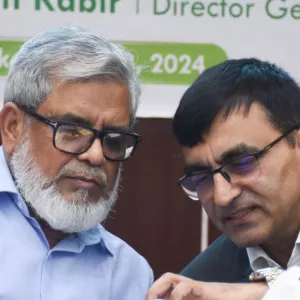IRRI and HSBC Bank Collaborate to Boost Rice Productivity and Resilience in the Haor Region of Bangladesh
IRRI and HSBC Bank have joined hands for a three-year project from 2024 to 2027 to build climate-smart rice value chains in Bangladesh’s Haor regions. The project will implement interventions in two districts. The project aims to increase the productivity, profitability, and resilience of the rice value chains in the Haor ecosystem through increased adoption of improved and climate-smart rice

IRRI and HSBC Bank Collaborate to Boost Rice Productivity and Resilience in the Haor Region of Bangladesh
IRRI and HSBC Bank have joined hands for a three-year project from 2024 to 2027 to build climate-smart rice value chains in Bangladesh’s Haor regions. The project will implement interventions in two districts. The project aims to increase the productivity, profitability, and resilience of the rice value chains in the Haor ecosystem through increased adoption of improved and climate-smart rice varieties, seed systems, mechanization, local capacity building of rice-based innovations, and development of agri-entrepreneurs.
Dhaka, Bangladesh (3 June 2024) – The International Rice Research Institute (IRRI) has launched a three-year project with HSBC Bank to transform the rice value chain in Bangladesh’s Haor Region. The project was launched in Dhaka, with IRRI and HSBC Bank co-organizing an inception workshop. The project seeks to develop efficient, inclusive, resilient, and sustainable rice value chains in the Haor Region by adopting improved technologies and innovations, addressing critical challenges faced by the region’s rice farming communities.
The Haor Region heavily relies on agriculture and aquaculture, with 55% of the population depending on these activities for their livelihood. A Haor is a wetland ecosystem in the northeastern part of Bangladesh with unique biophysical, hydrological, ecological, agricultural, and economic characteristics. During monsoon season, Haors receive surface runoff water from rivers and canals, which becomes vast stretches of turbulent water. The Haor Region comprises seven districts (Sunamganj, Habiganj, Moulvibazar, Sylhet, Netrakona, Kishoreganj, and Brahmanbaria), and there are 373 Haors (0.87 million ha) in these seven districts, which accounts for 53% of the total area of the Haor Region.
The total cultivated area in the Haor Region is 1.26 million hectares, of which 66% is under Haors, where farmers can grow only one crop in a year, which is Boro rice from November to May; the land is under deep water for…

